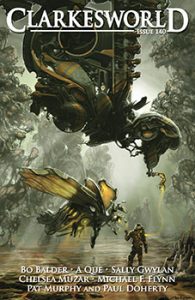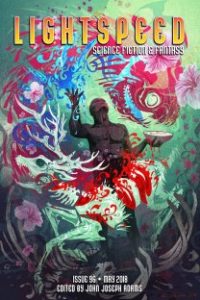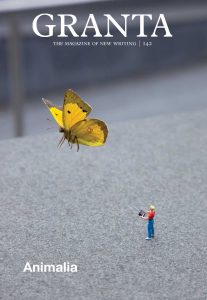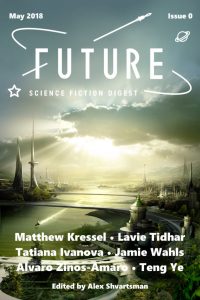Each month, Daniel Haeusser reviews short works of SFT that appear both online and in print. He is an Assistant Professor in the Biology Department at Canisius College, where he teaches microbiology and leads student research projects with bacteria and bacteriophage. He’s also an associate blogger with the American Society for Microbiology’s popular Small Things Considered. Daniel reads broadly in English and French, and his book reviews can be found at Reading1000Lives or Skiffy & Fanty. You can also connect with him on Goodreads or Twitter.
 “Farewell, Doraemon” by A Que, translated from the Chinese by Emily Jin and Ken Liu
“Farewell, Doraemon” by A Que, translated from the Chinese by Emily Jin and Ken Liu
Clarkesworld Magazine #140, May 2018
Faced with career difficulties, Hu Zhou returns from the city to his home village, seeking to reconnect with his childhood love Tang Lu, a friendship forged over the Doraemon cartoon and promises of loyalty and protection. He finds that Tang Lu’s life has become just as damaged through circumstances that trace back to one defining moment, and a mystery from their childhood. While an entertaining story overall, this novella is too long and fails to break significant ground in terms of theme or execution. The story is partly about that universal nostalgia of childhood and the realization that one can’t really ever return to the purity and innocence of those memories. It also becomes about the possibility of having the power to change one turn of events in the past to bring another reality to fruition. A Que manages these themes okay, but it does all end up seeming well-trod and predictable. While not one of my concerns, some readers might also object to the story’s minimal speculative element, which only appears at its end. This speculative element necessitates the story flowing non-linearly between events in the present and the past, but that also adds a large word count to a tale whose charm mostly comes from the time of Hu Zhou’s childhood village.
 “Night Journey of the Dragon-Horse” by Xia Jia, translated from the Chinese by Ken Liu
“Night Journey of the Dragon-Horse” by Xia Jia, translated from the Chinese by Ken Liu
Lightspeed Magazine #96, May 2018
An atmospheric story that is light on plot, but rich in symbolism and beauty. This one will mostly appeal to readers who enjoy the entrancement of mood pieces. Prior to its appearance in the fantasy half of Lightspeed, the English translation of Xia Jia’s story first appeared in Liu’s collection Invisible Planets: Contemporary Chinese Science Fiction in Translation. And the story could easily fit into the confines of fantasy or science fiction. It is a hybrid, a trait with great meaning here for the story’s theme. A giant horse-dragon robotic chimera awakens long after the disappearance of its human creators. At first aimlessly wandering amid fragmentary memories, he soon meets a bat who joins him. Together they share stories of the past, in search of a future home. Xia Jia’s story is suffused with cultural references that might not be immediately recognizable to foreign readers. For instance, the dragon-horse is based on a real creation shared between France and China, born from a Chinese saying, “vigorous as dragon and horse”. The bat also references lines from a famous Chinese poet. Yet, readers should get the point to these references even if not precisely familiar with their origin and details. Indeed, the story serves as an ideal source for translation between multiple cultures because behind all its mood and symbolism lies a reflection on multicultural hybridism. Horse-dragon, machine-natural, Eastern-Western, dream-reality, fantasy-science fiction, the story raises the question of what defines identity and homeland when someone becomes an amalgam more than just their sum parts.
 “Bonsai” by Martín Felipe Castagnet, translated from the Spanish by George Henson
“Bonsai” by Martín Felipe Castagnet, translated from the Spanish by George Henson
Latin American Literature Today 1 (6), May 2018
“Bonsai” is written in the form of an interview with a young person who was born eight years and one month ago, but following a gestation period of five years and ten months. Interestingly, though the original Spanish makes the gender of this individual clear from the start: “Cuando era chico…”, the English translation makes identification ambiguous in that moment (“When I was small…”), and thereafter. Stunted, frail, and unable to speak or leave the darkness of seclusion, the young man types answers to the interviewer’s questions regarding the history of his unique birth and its consequences. The tone of his responses hold a nice mixture of clinical detachment and a yearning for emotional connection to his mother, whose choice of prolonged pregnancy and keeping her child within the relative safety of the womb led to her death. Though short, it tackles some complex issues.
 “Jagged Rage” by Javier González Cárdenas, translated from the Spanish by Christina Miller
“Jagged Rage” by Javier González Cárdenas, translated from the Spanish by Christina Miller
Latin American Literature Today 1 (6), May 2018
A story I would classify as science fiction horror and that could carry a warning with it for readers who would be sensitive to situations or topics of extreme violence, including torture and rape. In an unspecified future, General Rachstad serves a fascist regime and delights in exerting his power with depraved abandon over the most innocent specimens he can find. While accompanied in an unpoliced zone with ‘anti-demographic’ agents, Rachstad makes time to stop off at a cave where a pimp he knows from the past has set up ‘a brothel of virtual attractions and robotic eroticism’. The General goes there in search of something more ‘real’ and instead ends up being part of an experiment involving axolotl and corpse reanimation. Cárdenas uses the intense subject matter in a common direction of revenge, where the monstrous human gets comeuppance from former or would-be victims who turn out to be even more, but differently, monstrous. What makes this story stand out as unique from the simple revenge formula is Cárdenas’ use of biological terms and speculation to impart the body horror and concept of ‘narcozombies’.
 “The Eye” by Liliana Colanzi, translated from the Spanish by Auston Stiefer
“The Eye” by Liliana Colanzi, translated from the Spanish by Auston Stiefer
Latin American Literature Today 1 (6), May 2018
A profoundly expert short story with depth far beyond its length, “The Eye” features an young woman who is intelligent, but struggling to find her place and confidence in the world. Her mother is emotionally abusive, an ever-present eye monitoring her every action, a constant reminder to beware “The Enemy”. Her professors are disappointed with her work, pushing her to do more, but with vague feedback that leaves her without a clear path to succeeding or growing. Her fellow students lie to her, abandon her, skipping out on responsibilities with the expectation that she’ll cover for them. Amid this treatment by others the girl abuses herself. She cuts. She purges. But one day out comes an eye, followed by an awakening and transformation, and a sense that something of destiny is coming. This apocalyptic tale slowly builds up from short paragraphs to one long one of release, with a powerful ending.
 “Doctor AN” by Edmundo Paz Soldán, translated from the Spanish by Arthur Dixon
“Doctor AN” by Edmundo Paz Soldán, translated from the Spanish by Arthur Dixon
Latin American Literature Today 1 (6), May 2018
Written for James Tiptree Jr. (Alice Sheldon) in homage/reference to her 1969 Nebula-nominated short story “The Last Flight of Dr. Ain”. The stories share the detail of spreading illness, but Soldán’s quickly sets itself apart as taking place in a more distant science fictional future by employing invented words and place-names/peoples, and argot. The distant, subtle nature of Tiptree’s original is kept here, though Soldán extends the mystery by also bringing in elements of hallucination and shifting from biological to chemical warfare. Regardless if you’ve read Tiptree’s classic or not, read both of these together.
 “They Will Dream in the Garden” by Gabriela Damián Miravete, translated from the Spanish by Adrian Demopulos
“They Will Dream in the Garden” by Gabriela Damián Miravete, translated from the Spanish by Adrian Demopulos
Latin American Literature Today 1 (6), May 2018
As in the title, Miravete writes the story predominantly in the simple future tense, which in combination with the title and textual flow imparts a wispy, illusionary affect as if events are passing in that haze of future uncertainty. At first this will be pleasantly poetic. But then it will start to grate, as if each and every verb will be calling out to itself for undue notice that it will want to call from you. These sections are broken with the more conventional, familiar past tense that serve to give the reader some background on characters and the situation being described. The story involves a group of children brought by an apprentice Teacher to a garden that contains interactive holographic projections, silhouettes, of women who have been killed. Marisela, the Caretaker and designer of this shrine, built it using technology she had worked with as a way to bring these destroyed women back to life, while the Mexican state encouraged it to be a more of a memorial, an impersonal education tool against violence. Once you get used to the portions written in the more unconventional tense, this is an effectively thought-provoking story on the concepts of memorials and the limits of dealing with horrific violence against individuals.
 (Excerpt from) The Last Children of Tokyo by Yoko Tawada, translated from the Japanese by Margaret Mitsutani
(Excerpt from) The Last Children of Tokyo by Yoko Tawada, translated from the Japanese by Margaret Mitsutani
Granta 142: Animalia
In the near future, climate change, pollution, and other associated natural disasters have devastated the surface of the Earth. Food is scarce and countless animal species have vanished. The young are born sickly and infirm, leaving physical labor to the elderly. Over one hundred years old, Yoshiro is dealing with the ever-increasing difficulty of survival and caring for his great grandson Mumei. Unfortunately, Granta doesn’t indicate that this is an excerpt from a novel, not an actual short story. My rule #2 of reading is: Excerpts are evil, not short stories. So I wouldn’t have read this if I had known. As most excerpts it serves more as an introduction to style and tone rather than characters or plot. From this short text it appears a standard literary foray into post-apocalyptic genre territory. I remain more interested in the novel due to its associated blurb and plot summary than by this.
 “Impress Me, Then We’ll Talk About the Money” by Tatiana Ivanova, translated from the Russian by Alex Shvartsman
“Impress Me, Then We’ll Talk About the Money” by Tatiana Ivanova, translated from the Russian by Alex Shvartsman
Future Science Fiction Digest Issue 0, May 2018
Editor and writer Alex Shvartsman provides the English translation of this story by Ivanova, a sociologist and futurist, for the pilot issue of his Future Science Fiction Digest. I almost abandoned reading this story because of my rule #1: You don’t waste time reading stories in the second person. What saved this one from my rule is that technically it’s written in the first person perspective of Gideon Gorsky, just with substantial sections addressed to the narrator’s wife, who at the start of the story has a genetic decoder aimed at Gideon’s forehead as the world descends into chaos of ‘transmutations’ around them. “My dear, it may be time to talk about our relationship.” And there is the second reason why I forced myself to read on: Ivanova’s dry humor. The plot reveals how Gorsky, a self-taught pharmacologist, got into this situation. It begins when he goes to a businessman with a proposal full of far more confidence than warranted. His plan: to sell people a pill that can give them precisely what they want- natural blond hair. So far Gorsky has only a few grams of barely tested powder, but he has hopes for far more. Soon he is making pills that make this cosmetic change to people, and others. As the changes escalate so do the side effects. Well, side effects are just opportunities for more drugs, and more money. Humorous, the story thus also serves as a poignant commentary on the capitalism of the pharmaceutical industry. Despite my reservations, I gave this story a chance and it did indeed impress me!
 “Universal Cigarettes” by Teng Ye, translated from the Chinese by Yuzhi Yang
“Universal Cigarettes” by Teng Ye, translated from the Chinese by Yuzhi Yang
Future Science Fiction Digest Issue 0, May 2018
Science fiction with a spike of humor continues in the translations of this inaugural issue of Shvartsman’s new magazine. Qin Fei is heir to Earth’s Universal Cigarette Company. But the recent debut of cheap ‘mood nicotine’ from the interstellar market threatens his business’s future. The solution? Go luxury and go deluxe: Hou Ji Space Station descends into the Pacific Ocean to be converted into the largest cigarette ever. At the start of Teng Ye’s story I thought about ‘what if a cigar-shaped UFOs was just a cigar?’ Halfway through I started to hum Tex William’s “Smoke Smoke Smoke (That Cigarette)”. By the end I thought of Ambrose Bierce and a certain bridge. But throughout, “Universal Cigarettes” was a fun short read.
